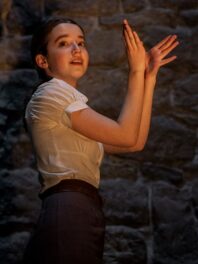
Sometimes, the most difficult thing to do can be to choose kindness.
Directed by Marc Forster, White Bird introduces us to Julian (Bryce Gheisar), a troubled young man who is struggling to fit in at his new school. He encounters his visiting grandmother Sara (Helen Mirren) who has a story to tell him about her youth. She’s also making an effort to help her grandson get his life together. To do so, she shares her story of courage as she came under oppression in Nazi-occupied France. On the run because of her Jewish heritage, she is offered shelter by a young boy from school in their family barn. As his family does everything in their power to keep her safe, Sara learns the value of kindness and the strength it takes to do what’s right.
With Forster at the helm, White Bird is an effective Holocaust thriller that’s clearly targeting pre-teen youth. Based on the book by R.J. Palacio (Wonder), this story is designed to engage complex topics with softer tones than we’re often used to seeing. Effective in its execution, there’s no doubt that Forster is holding back for the sake of his audience, a trait that may alienate viewers looking for a stronger punch. However, this should not be considered a criticism either. In fact, the opportunity to start conversations about the horrors of war with younger viewers is a rarity and White Bird never loses sight of its overall goal.
By telling the story through Sara’s eyes, we are able to experience the fear of someone who feels emotionally lost. For Sara, the world has spiraled quickly and she doesn’t fully understand how things have unravelled. However, in Julian’s barn, she has a place of safety.
It’s not a home. But it is (mostly) secure.
And, in some ways, Forster allows Sara to find a sense of whimsy within its walls. Despite the forced nature of her residence within its tattered boards, Sara and Julian are able to look beyond their situation into a dreamlike world. In these moments, Forster fills the screen with warm colours, giving the experience an experience akin to Dorothy travelling through the Emerald City in The Wizard of Oz. Every turn is filled with wonder and it becomes a respite from the trauma around them. (In fact, one could even argue that the film itself takes on a sort of ‘bedtime story’ structure as Mirren’s character shares her story to her grandson with honesty and poise.)
In this spirit, the film is looking for any opportunity to remind younger viewers that they hold the keys to preventing this sort of horror from taking place again. Similar to Palacio’s Wonder, White Bird also has an emphasis on ‘choosing kind’. Julian’s care for Sara is greater than any potential romantic involvement (even if that potential remains). Instead, he sees the value in her and the injustice that surrounds them. He’s under no obligation to do so but he knows what’s right and chooses to do what he can to keep Sara safe. (After all, he understands what it means to be oppressed as an outcast.) While the messaging remains admittedly simple, its application in the Second World War adds a deeper layer to it that should create solid conversations to those who are willing to engage after the credits roll.
At the same time, Forster knows when to take the gloves off as well. In the film’s third act, he’s far more willing to let the harsh realities of the Second World War. These are the most intense scenes and, arguably, its best. However, Forster never loses sight of his audience. The film’s most graphic moments remain suitable for tween viewers, yet still have the necessary shock value to drive home the message.
In the end, one can’t deny that White Bird accomplishes its mission. While it isn’t the most intense film about the Holocaust, it is an absolutely age-appropriate way to bridge the topic of one of the most traumatic moments in modern history.
White Bird is available in theatres on Friday, October 4th, 2024.
- Rated: PG-13
- Genre: Drama, Family, History, War
- Release Date: 10/4/2024
- Directed by: Marc Forster
- Starring: Ariella Glaser, Bryce Gheisar, Gillian Anderson, Helen Mirren, Jo Stone-Fewings, Orlando Schwerdt, Patsy Ferran
- Produced by: David Hoberman, David Minkowski, Matthew Stillman, R.J. Palacio, Todd Lieberman
- Written by: Mark Bomback
- Studio: 2DUX², Kingdom Story Company, Lionsgate, Mandeville Films, Media Capital Technologies, Participant

